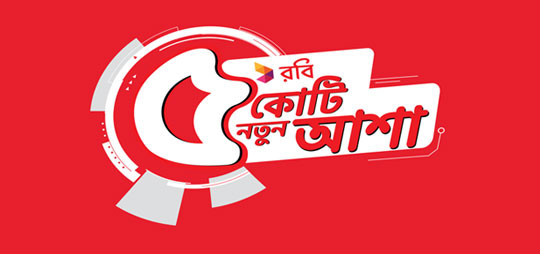Robi takes strident steps towards sustainable growth
Robi’s effective tax rate of 77.06% limits profit to 116 crore taka in first nine months of 2020; 2% minimum turnover tax continues to cripple the bottom line
KEY HIGHLIGHTS – Q3’20
- Active Subscriber-base: 5 crore 01 lakhs (Representing 30% of subscriber market share)
- Internet Subscribers: 3 crore 47 lakhs internet subscribers (Which is 69.2% of total subscriber base)
- Revenue: 1,934 crore taka
- Earnings Before Income Tax Depreciation and Amortization (EBITDA): 788 crore taka
- Capex investment: 362.5 crore taka
- Profit After Tax (PAT): 38.9 crore taka
- Contribution to Government Exchequer: 875.1 crore taka (Representing 45.3% of Robi’s total revenue for the quarter)
Dhaka, 26 November 2020: Riding on 9.7% revenue growth from last quarter, Robi ended the third quarter of this year with a profit of 38.9 crore taka. Consistent focus on innovation and analytics raised Robi’s revenue for the third quarter to 1,934 crore taka.
Considering Robi’s effective tax rate of 77.06% for the first nine months of this year, the company’s profit of 116 crore taka for the period clearly indicates that Robi is run with excellent operational efficiency. Had it not been for the crushing 2% minimum turnover tax, this profit figure would have looked far more appealing.
Robi’s active subscriber base now stands at 5 crore 1 lakh representing 30% of market share. Active subscriber base increased by 4.5% compared to the previous quarter, which was the highest in the industry. Out of 5 crore 1 lakh active subscribers, 3 crore 47 lakhs are internet users representing 69.2% of Robi’s total subscriber base.
Robi’s voice revenue saw double digit growth of 12.1% compared to the previous quarter, reaching 972 crore taka in Q3’20. However, compared to the same quarter last year, voice revenue dipped by 8.2% indicating sharp decline in 2G based voice call service caused by the corona pandemic.
Data revenue reached 684 crore taka in Q3’20 following an increase of 6.8% compared to the previous quarter. Compared to the same quarter last year, data revenue grew by 22% in Q3’20.
Although Robi registered 9.7% revenue growth compared to last quarter, the company’s EBITDA and profit after tax declined by 10.7% and 33.4% respectively from last quarter, largely due to focused drive to acquire subscribers and accelerated roll-out of additional sites which had slowed down significantly during the lockdown situation in Q2’20.
In the first nine months (Jan-Sept) of this year, Robi’s total revenue reached 5,644 crore taka; compared to the same period (Jan-Sept) of last year, this translates into 1.0% growth. Robi’s EBITDA and profit after tax for the first nine months (Jan-Sept) of this year stands at 2,458 crore taka and 116 crore taka respectively. Compared to the same period (Jan-Sept) of last year, EBITDA and profit after tax jumped by 7.5% and 1.9% respectively in the first nine months (Jan-Sept) of this year.
Robi has paid 875.1 crore taka to the Government exchequer in Q3’20, representing 45.3% of Robi’s total revenue for the quarter. The company has deposited 2,752 crore taka to the state coffers in the first nine months of 2020. Robi’s CAPEX investment in this quarter was 362.5 crore taka taking company’s total investment to 1,441 crore taka in the first nine months of 2020.
Commenting on the financial performance of the company, Robi’s Managing Director and CEO, Mahtab Uddin Ahmed said: “On the backdrop of our imminent entry into the country’s stock markets, we are very happy to maintain profitability in Q3’20 supported by enviable revenue growth. The most heartening part of our performance is the growing impact of our continued focus on analytics driven innovative initiatives. However, the excessively high taxation regime continues to undermine our performance, with minimum 2% turnover tax casting the darkest spell on our business. We hope that the Government will allow us more fiscal headroom by addressing this stumbling block, so that we can share the fruits of improved performance with our new shareholders following the stock market listing.”


